|
|
|
Sort Order |
|
|
|
Items / Page
|
|
|
|
|
|
|
| Srl | Item |
| 1 |
ID:
137430
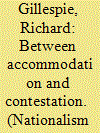

|
|
|
|
|
| Summary/Abstract |
The recent emphasis placed by several mainstream nationalist parties in Europe on sovereignty objectives invites analysis of the drivers behind this phenomenon. Their evolution is characterized by a complex set of dynamics that influences their options when faced with strategic decisions over participation in an existing state and/or challenging it by pressing for statehood. Spain constitutes a major laboratory for studying such dynamics owing to a diverse range of nationally- oriented parties. The experiences of the Basque Country and Catalonia show the continued relevance of center-periphery cleavages, especially when aggravated by European and global pressures and constraints, but party positioning between accommodation and sovereignty politics is influenced too by changing relationships between Basque and Catalan nationalist elites and civil societies and between mainstream nationalist parties and their direct competitors within party systems.
|
|
|
|
|
|
|
|
|
|
|
|
|
|
|
|
| 2 |
ID:
058972
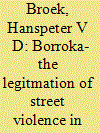

|
|
|
| 3 |
ID:
121872


|
|
|
|
|
| Publication |
2013.
|
| Summary/Abstract |
Immigration from the different regions in Spain to the Basque Country has traditionally opposed Basque and Spanish nationalism. This article provides an overview of the discourse of both nationalist traditions with respect to the intra-regional migration movement of the second half of the twentieth century as well as of the resulting controversy. Whereas the Basque nationalist movement claims to have defended the need to integrate immigrants since the middle of the twentieth century, particularly through politics, Spanish nationalism claims that Basque nationalism has helped marginalise these same immigrants. A qualitative analysis is used to contrast this controversy by consulting the opinion of the Spanish immigrants who settled in the Basque Country and did not avail of the political integration proposed by Basque nationalism. The main conclusion is that these immigrants tend to avoid the heart of the matter of discord between both nationalist traditions, granting little importance to political and cultural elements though stressing their social integration in the Basque Country.
|
|
|
|
|
|
|
|
|
|
|
|
|
|
|
|
| 4 |
ID:
095081
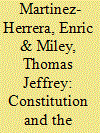

|
|
|
|
|
| Publication |
2010.
|
| Summary/Abstract |
The 1978 Spanish Constitution enshrined the recognition of linguistic, cultural, and some degree of 'national' pluralism in the country and outlined procedural mechanisms for the creation of regional 'autonomies', which has given rise to a de facto asymmetrical federal state. This article begins by analyzing the compromise over issues of national identity embedded in the Constitution and the process by which this was forged. It highlights the articulation among political forces of contending conceptions of national identity and different projects for reorganising the territorial structure within and/or against the Spanish state. It also describes the social bases of support for the respective projects. Next, the article examines recent challenges to the parameters of the constitutional compromise. It shows that citizens' support for the basic parameters of the 1978 compromise remains high and has even become stronger. It emphasises that the preferences of the general public stand in sharp contrast with the preferences of influential sections of the Basque and Catalan regional political establishment, and it concludes that current challenges to the constitutional compromise are driven by political elites.
|
|
|
|
|
|
|
|
|
|
|
|
|
|
|
|
| 5 |
ID:
095096
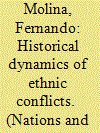

|
|
|
|
|
| Publication |
2010.
|
| Summary/Abstract |
All the historical moments in which the Basque debate reached political protagonism in contemporary Spain coincided with political contexts of institutional democratisation. The debate on patriotism in the Basque Country is connected with a uniform narrative regarding the Basques and their moral distance from the Spanish nation: the 'Basque problem'. This narrative has fostered a confrontational discourse between Spanish and Basque nationalism. It has also promoted recourse to specific stereotypical images of the Basques, which bind ethnicity to collective identity. Such representations reveal that the invention of the Basque country as a uniform ethnic collective had much more to do with the internal contradictions of Spanish national identity - and later of Basque identity - than with the existence of a secular conflict between Basques and Spaniards. The Basque case shows that every 'ethnic conflict' requires adequate contextualisation in order to avoid simplifying its origins and past pathways to make it conform to present uses.
|
|
|
|
|
|
|
|
|
|
|
|
|
|
|
|
| 6 |
ID:
138883
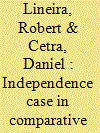

|
|
|
|
|
| Summary/Abstract |
Scotland is not the only sub-state unit in Europe where relevant political actors make claims for independence. To generate insights on these independence demands, we compare the drivers, arguments and popular support for secession in Scotland, the Basque Country, Catalonia and Flanders. We argue that national identity, party politics and the economy are behind the independence requests, and the exact articulation of these elements varies from case to case. Currently, the most salient of these demands are the ones from Catalonia; Basque demands for self-determination are less prominent than in the past, whereas the demand for a vote on independence is much less articulated in Flanders. Although the Scottish independence referendum has set a precedent for solving independence disputes, we argue that the possibilities of exporting the Scottish referendum experience to other realities are limited.
|
|
|
|
|
|
|
|
|
|
|
|
|
|
|
|
| 7 |
ID:
084558
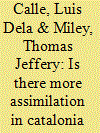

|
|
|
| 8 |
ID:
120321


|
|
|
|
|
| Publication |
2013.
|
| Summary/Abstract |
We deal in this article with the relationship between ETA attacks and electoral support for Batasuna, its political wing. We show that the relationship is twofold, since the geographical distribution of electoral support for the terrorists affects the location of ETA attacks, but violence also influences electoral support for the terrorist cause. On the one hand, when ETA chooses a location for its attacks, it takes into account the electoral strength of Batasuna. Our results show that the higher the vote for Batasuna in a municipality, the more likely members of the security forces will be killed there. With regard to the targeting of civilians, the relationship is curvilinear. ETA kills civilians in municipalities that are polarized, where support for Batasuna falls short of being hegemonic. On the other hand, our results also show that ETA attacks have an effect on the size of its support community. When ETA kills members of the security forces, voters punish the Batasuna party electorally. In the case of civilians, it depends on the specifics of the various campaigns. We find that when ETA kills informers and drug-dealers, the vote for Batasuna increases. ETA's killing of non-nationalist politicians, however, decreases Batasuna's vote share.
|
|
|
|
|
|
|
|
|
|
|
|
|
|
|
|
| 9 |
ID:
152865
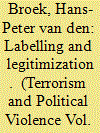

|
|
|
|
|
| Summary/Abstract |
This article focuses on the role of labelling in the discourse employed by the Left-Wing Nationalist movement in the Basque Country to legitimize the use of violence for political ends. The approach in this article goes beyond classic labelling theory. I demonstrate that radical Nationalists do not passively undergo their being labelled as deviants (fanatics, terrorists) by society, but develop counter-labels instead to define their opponents and re-label themselves.
|
|
|
|
|
|
|
|
|
|
|
|
|
|
|
|
| 10 |
ID:
190082


|
|
|
|
|
| Summary/Abstract |
We analyzed psychosocial influences on political life in the Basque Country according to Doise’s theory on the articulation between the individual, the interindividual, groups, and society. Political-party experiences and evaluations of system legitimacy during elections (local, regional, general, and European) were considered. Party choice was linked to atheism and without-religion among Spanish progressive voters (Podemos); Christianity to Basque conservative nationalism (PNV); Basque identity to Basque progressive nationalism (EH-Bildu); and Spanish identity to conservativism (PP). On the whole, Basque parties’ voters stressed more economy/administration and politicians’ individual traits, while Spanish party voters focused more on civil/social rights.
|
|
|
|
|
|
|
|
|
|
|
|
|
|
|
|
| 11 |
ID:
057780


|
|
|
| 12 |
ID:
088402


|
|
|
|
|
| Publication |
2009.
|
| Summary/Abstract |
Is globalization forcing economies that are not coordinated market economies, such as Spain's, to converge on a British-American model? This essay seeks to build on the hypotheses generated by the literature on varieties of capitalism to analyze the challenges of developing and sustaining coordination while adjusting for economic change. In particular, it seeks to explore ways in which subnational factors promote the ability of socioeconomic actors to develop public-private institutions. By focusing on a particular autonomous region of Spain, the Basque Country, this article explores the role of institutional arrangements at the regional level in determining national adjustment. In the Basque Country the relative power and the particular interests of the regional state have been central factors in promoting distinctive patterns of coordination. At the same time, actors' preferences and policy outcomes have been constrained by the differences in the quality and configuration of institutional frameworks, political deals, and the existing economic structure.
|
|
|
|
|
|
|
|
|
|
|
|
|
|
|
|
| 13 |
ID:
121746


|
|
|
|
|
| Publication |
2013.
|
| Summary/Abstract |
This article aims to analyse the sources of terrorist financing of the Euskadi Ta Askatasuna (ETA). It takes into account the network of entities that, under the leadership and oversight of ETA, have developed the political, economic, cultural, support and propaganda agenda of their terrorist project. This study focuses, in particular, on the periods 1993-2002 and 2003-2010, to observe the changes in the financing of terrorism after the outlawing of Batasuna, ETA's political wing. The results show the significant role of public subsidies in finance the terrorist network. It also proves that the outlawing of Batasuna caused a major change in that funding.
|
|
|
|
|
|
|
|
|
|
|
|
|
|
|
|
|
|
|
|
|